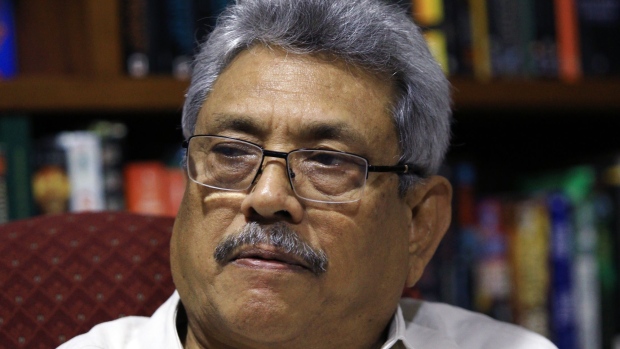Apr 4, 2022
Sri Lanka’s Rajapaksa Seeks Safety in New Cabinet Amid Protests
, Bloomberg News

(Bloomberg) -- The family that’s ruled Sri Lanka with an iron hand for most of the last 15 years is throwing itself a safety net. President Gotabaya Rajapaksa is asking the opposition to join a new interim government -- as anger over the island nation’s hours-long power cuts and food and fuel shortages spills out into the streets.
The national cabinet offered to resign late Sunday, the first sign that the pain from Asia’s fastest inflation has hit close to home for Rajapaksa, whose family controlled key ministries. Despite a two-thirds majority in parliament and a history of not brooking any dissent, the former military officer is hard-pressed to resolve an economic crisis that now impacts every element of life in the country.
Daily power cuts that can stretch to over 13 hours a day, fuel lines that go on for miles and a shortage of everything from life saving drugs to food has brought angry citizens to the streets, despite curfews and the use of tear gas to disperse crowds.
“Considering this a national need, the time has come to work together for the sake of all the citizens and future generations,” Rajapaksa’s media office said in a statement Monday. “The President invites all political parties representing in the parliament to come together to accept ministerial portfolios in order to find solutions to this national crisis.”
This is perhaps the first sign that the Rajapaksa clan is looking for a way to avoid or at least delay any political consequences from the allegations that years of their economic mismanagement have brought unprecedented despair to ordinary citizens.
On Monday, the president swore in new finance minister Ali Sabry, who replaces the youngest Rajapaksa brother Basil and is among the key decision makers as the country starts bailout talks with International Monetary Fund. G.L. Pieris will continue as the foreign minister.
Sabry and Pieris are part of a team that will oversee debt restructure, key to obtaining support from the IMF. Central bank governor Ajith Nivard Cabraal, who had opposed aid from the multilateral lender, offered to quit separately -- a day before the authority was due to announce its interest rate decision.
Uncertain Opposition
Opposition groups remain wary of being drawn into government without any fundamental changes to the country’s constitution, which Rajapaksa amended in 2020, soon after he won the presidential elections, to give sweeping powers to his office.
“The concentration of power with one family, the autocratic decision making is clearly the reason for this debacle,” said Harsha De Silva, a lawmaker from the main opposition Samagi Jana Balawegaya, adding that senior members of the Rajapaksa administration have been in touch with his party “to work together, for six months to a year.”
“The people are suffering. As the main opposition we have to minimize that,” De Silva added. “To do that the economy needs to be stabilized. A whole host of structural reforms have to take place. We do not see any future with the 20th amendment,” he said, referring to the constitutional changes that gave Rajapaksa expansive powers, including the ability to dissolve parliament midway through its five year term and appoint top government officials.
Sri Lanka is now staring at a default of its debt, even as inflation has accelerated at the fastest pace in Asia and the rupee has collapsed. It’s undergoing a severe shortage of food and fuel as it runs out of dollars to pay for imports. Soaring prices and shortages of essential items have played a major role in people taking to the streets to call for Rajapaksa and his family to resign.
The administration has devalued the rupee, raised interest rates, placed curbs on non-essential imports and reduced stock-trading hours to preserve electricity and foreign currency.
Street Protests
Sri Lanka’s current crisis has been in the making for several months. Last year the government banned imports of chemical fertilizers in a bid to save dollars. It was touted as move to encourage organic farming. By the time the measure was rolled back, amid farmers’ protests, the damage was done, with a 20%-30% drop in rice paddy output and a sharp jump in prices.
It resisted turning to the IMF until it was left with no choice, finally seeking bailout talks last month. It’s also asking for bilateral aid from countries including China, India and Bangladesh.
If the anger on the streets and on social media is any indication, the president’s attempts to include the opposition may not be enough to save it from the ire of its citizens.
Angry street protests are now a regular feature in capital Colombo and other cities despite a emergency rule impose by Rajapaksa. Celebrities have taken to Twitter to censure the government, especially the Rajapaksas -- something unheard even a month ago.
“I think what we really need now is the change of the system,” said Jehan Perera, executive director at the National Peace Council of Sri Lanka. “And the people in charge have to change. The faces have to change at the ministries.”
©2022 Bloomberg L.P.







